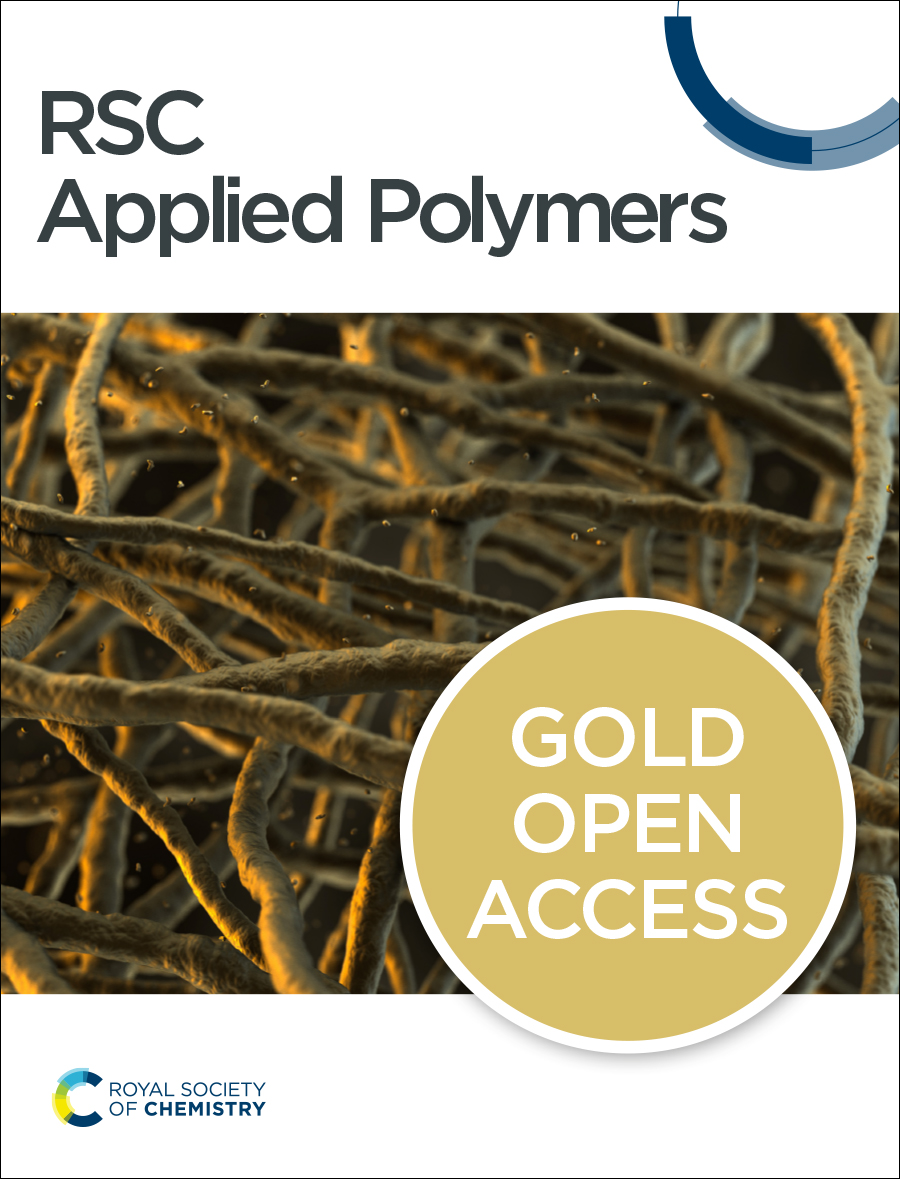What would you like to know about this journal?
Editor-in-Chief: Emily Pentzer
Impact factor: n/a
Gold open access, APCs currently waived
Time to first decision (peer-reviewed only): 30.0 days**
Time to first decision (all decisions): 5.0 days***
Going beyond the traditional boundaries of the chemical sciences

RSC Applied Polymers is one of the first of our journals to focus on applied research. The RSC Science Horizons report identifies how the chemical sciences are key to unravelling global and industrial challenges and particularly focuses on how interdisciplinary and applied research can contribute. With this in mind, RSC Applied Polymers offers you an impactful platform for the application of polymers, both natural and synthetic, including experimental and computational studies.
This journal is part of our new offering. Scientists can continue to find innovative polymer research in our existing journal, Polymer Chemistry, and discover interdisciplinary, application-focused work in RSC Applied Polymers. Together, these two journals give you more options to explore and publish impactful research across the spectrum of polymer science.
Hear from our Editor-in-Chief: Emily Pentzer

RSC Applied Polymers will be the leading international journal for the latest advances made possible with polymers, from energy harvesting and management to payload delivery, and beyond.
The journal will promote the advancement of science by publishing timely and impactful cross-disciplinary research that connects fundamental insights to performance-related metrics.
Scope
RSC Applied Polymers is a leading international journal for the application of polymers, including experimental and computational studies on both natural and synthetic systems.
The journal is a premier cross-disciplinary publishing home for scientific research that leverages polymeric materials in a range of applications, welcoming high-impact advances made possible with polymers across materials, biology, energy applications, and beyond.
Polymer researchers across chemistry, materials science, biology, and engineering, are all welcome to share timely and impactful contributions, connecting fundamental scientific insights to performance-related metrics. The journal welcomes research on the application of polymers in different areas, and the relationship to structure and/or composition, as afforded by synthesis and/or processing.
Topics include but are not limited to:
- Materials: inks, packaging, coatings, membranes, textiles, dyes/pigments, flame retardants, reprocessable/recyclable, etc.
- Biology: bioinspired/biomimicking, biointerfacing, bioresponsive, therapeutic, etc.
- Energy: harvesting, storage, interconversion, management, separations, etc.
Consistent with the vision and values of the RSC, the journal welcomes and celebrates research that supports the advancement of several UN Sustainable Development Goals (SDGs), including but not limited to SDG3: good health and well-being, SDG6: clean water and sanitation, SDG7: affordable and clean energy, and SDG12: including responsible production and consumption.
Our RSC Applied journal portfolio also includes RSC Applied Interfaces which publishes cutting-edge research on the applications of surfaces and interfaces. These journals are dedicated to science research with a strong applied focus. As such, work focusing on fundamental polymer science characterisation and properties will not be considered for publication in RSC Applied Polymers. The journal complements our portfolio of materials, nanoscience and multidisciplinary journals where fundamental polymer research is welcomed for submission, subject to individual journal scopes.
See who's on the team
Meet RSC Applied Polymers' Editor-in-Chief and board members.
Editor-in-Chief
Texas A&M University, USA
Associate Editor
University Grenoble Alpes, France
Associate Editor
Beijing University of Chemical Technology, China
Associate Editor
University of New South Wales, Australia
Jeremy Allen, Executive Editor, ORCID: 0000-0001-5169-2236
Hannah Kerr, Deputy Editor, ORCID: 0000-0002-2450-126X
Rosie Hague, Editorial Assistant
Daniella Ferluccio, Editorial Production Manager, ORCID: 0000-0002-3757-3713
Serra Arslancan Sengelen, Assistant Editor, ORCID: 0000-0001-9474-549X
Zita Zachariah, Assistant Editor, ORCID: 0000-0002-8501-2275
Zifei Lu, Assistant Editor, ORCID 0000-0002-6710-2808
Ashley Mitchinson, Assistant Editor
Robert Griffiths, Publishing Assistant
Neil Hammond, Publisher, ORCID: 0000-0001-6390-8874
Author guidelines
For general guidance on preparing an article please visit our Prepare your article page, the content of which is relevant to all our journals. Please note that RSC Applied Polymers does not require authors to submit using a specific template, but there are templates available if you wish to use them.
To learn more about the Royal Society of Chemistry's policies and processes, including licensing, experimental data guidelines, peer review and formatting, please refer to our Resources for authors and Experimental data guidelines pages.
Peer review and editorial process
All articles published in RSC Applied Polymers are subject to external peer review by experts in the field and all manuscripts submitted are handled by a team of internationally recognised Associate Editors, who are all practicing scientists in the field.
The peer review for all articles submitted to the journal consists of the following stages:
Phase 1: Your manuscript is initially assessed by an associate editor to determine its suitability for peer review.
Phase 2: If the manuscript passes the initial assessment process, the associate editor solicits recommendations from at least two reviewers who are experts in the field. They will provide a report along with their recommendation.
Phase 3: The associate editor handling your manuscript makes a decision based on the reviewer reports received. In the event that no clear decision can be made, another reviewer will be consulted.
RSC Applied Polymers is committed to a rigorous peer review process and expert editorial oversight for all published content. Please refer to our processes and policies for full details including our appeals procedure.
Transparent peer review policy
To support increased transparency, we offer authors the option of transparent peer review, where the editor’s decision letter, reviewers’ comments and authors’ response for all versions of the manuscript will be published alongside the article under an Open Access Creative Commons licence (CC-BY). Reviewers are anonymous unless they choose to sign their report.
Find out more about our transparent peer review policy.
Publication frequency
Articles accepted for publication in RSC Applied Polymers are published online with citeable DOIs as Advance Articles after they are edited and typeset. Articles are then assigned page numbers and published in an issue. Issues of RSC Applied Polymers are published every other month. Please find our most recent issue here.
Ethical Requirements
RSC Applied Polymers authors, editors, reviewers and published works are required to uphold the Royal Society of Chemistry’s ethical standards. The Royal Society of Chemistry is a member of the Committee on Publication Ethics (COPE) and our ethical standards follow COPE’s core practices and best practice guidelines. In cases where these guidelines are breached or appear to be so, the Royal Society of Chemistry will consult with COPE guidelines and act accordingly.
When a study involves the use of live animals or human subjects, authors must include in the 'methods/experimental' section of the manuscript a statement that all experiments were performed in compliance with the author’s institute’s policy on animal use and ethics; where possible, details of compliance with national or international laws or guidelines should be included. The statement must name the institutional/local ethics committee which has approved the study; where possible, the approval or case number should be provided. A statement that informed consent was obtained for any experimentation with human subjects is required. Reviewers may be asked to comment specifically on any cases in which concerns arise.
For further guidance on author responsibilities and code of conduct, which apply to RSC Applied Polymers and to all manuscripts submitted to Royal Society of Chemistry journals, please visit our author hub.
Open access
RSC Applied Polymers is gold open access. This means that your meaningful publications can be shared widely and accessed easily around the world. We’re also paying for all article processing charges (APCs) until mid-2025 – so when you’re ready to make a start, you can publish your work for free.
We offer RSC Applied Polymers authors a choice of two Creative Commons licences: CC BY or CC BY NC. Publication under these licences means that authors retain the copyright of their article, but users are allowed to read, download, copy, distribute, print, search, or link to the full texts of articles, or use them for any other lawful purpose, without asking prior permission from the publisher or the author. Read our open access statement for further information.
All published articles are deposited with LOCKSS, CLOCKSS, Portico and the British Library for archiving.
Dive into the benefits of open access publishing:
Find out more about open access publishing routes
Subscription information
RSC Applied Polymers is fully gold open access – articles can be downloaded free from the website with no barriers to access.
Copyright
Copyright is retained by authors when an open access licence is accepted, as with our standard licence to publish agreement. Full and accurate attribution to the original author is required for any re-use of the work. Find out more about copyright, licences and re-use permission.
Get email alerts about RSC Applied Polymers
For the latest editorial board news, scope details and announcements, sign up for news and issue alerts by using the form below.
Contact us
- Email:
- send us an email

